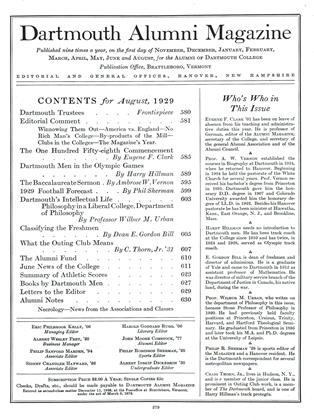Extra-curricular activities were reasonably popular even in the older days, when such by-products of the academic mill were less numerous and before we had all learned to describe them by so beautiful a name. They sound more impressive now than they used to, and they are more impressive. One or two among them have come to bear with some pertinence on work done for a degree and therefore savor slightly of the intracurricular. Still in the main such activities are a byproduct and as such are perhaps given less weight than they should be given—certainly less weight than undergraduates accord them. There abides a small but resolute body of educators, backed by a smaller but equally valiant body of alumni, inclined to do battle against the exaggeration of extra-curricular matters in the academic world.
Now there is room for the suspicion that the time has come for a fairer assessment of the value of such things on both sides. One is vaguely conscious that proponents and opponents of extra-curricular incidents are alike in need of making concessions. Such activities are beyond question incidentals to the main work of academic education, but it does not by any means follow that they are devoid of importance. In manufacturing it is found to be desirable to turn by-products to account, as in the case of the pork-packing establishment which boasted of utilizing every part of the pig but the squeal. Because several hundred young men have come together primarily to pursue a course of study leading to the A.B. degree, it is a natural consequence that they evolve incidental uses for their time. They will always do that, and always have. Natural jealousies incline the various parties in interest to lay varying stresses on their importance; but it is difficult to escape the conclusion that, as against the purely curricular aspect of a college year, extracurricular activity has been gaining ground, even in the estimation of faculty members, despite the known propensity of undergraduates and alumni to go farther than strictness of view would warrant in estimating the appropriate weight.
One mustn't expect too much of the adolescent. If he, approaching the question of going to college, has in mind the things he sees and hears most about—the sports, fraternities, musical activities, dramatics and the like—it is only natural. He has some direct knowledge of those, and extremely little of the real business of a college. He knows, to be sure, that the colleges do not exist mainly to play football, or to produce other interesting side-lines of activity; but he knows that rather vaguely, and it is a factor distinctly overshadowed by the things of which the newspapers make mention, and about which the alumni of his acquaintance talk most. This may not be a thing to quarrel with too bitterly, because, whatever we may think ought to be, it can hardly be denied that the realities are too strong for us. Hence the belief that what cannot be cured must not only be endured, but would best of all be turned to account. The utmost we can ask with some hope of attainment is a sane attitude of mind toward the harmonious whole, in which academic and non-academic activity may have appropriate valuesand in that, we firmly believe, alumni can do most of all to promote a just estimate.
Extra-curricular activities can be grossly overdone, and they are nearly as puzzling a problem in the high schools as they are in the colleges. They are not things one would like to see done away with and fortunately they cannot be done away with. They are things that can be exaggerated, however, and unfortunately that is only too easy. It is improbable that excesses can be avoided by dint of stern repression, but something might be accomplished by the slow cultivation of a proper public spirit among graduates. Not prohibition, but temperance, seems to be indicated.
 View Full Issue
View Full Issue
More From This Issue
-
 Class Notes
Class NotesCLASS OF 1879
August 1929 By Henry Melville -
 Article
ArticleAlumni Council Meetings
August 1929 -
 Article
ArticleThe One Hundred Fifty-Eighth Commencement
August 1929 By Eugene F. Clark -
 Class Notes
Class NotesCLASS OF 1899
August 1929 By Warren C. Kendall -
 Class Notes
Class NotesCLASS OF 1903
August 1929 By John Crowell -
 Class Notes
Class NotesCLASS OF 1918
August 1929 By Frederick W. Cassebeer
Article
-
 Article
ArticleDennis Francis Lyons 'O2, 1880-1937
April 1938 -
 Article
ArticleAlumni Fund in War Time
November 1942 -
 Article
ArticleAlumni Council Honors Judson Pierson '33
May 1975 -
 Article
ArticleDARTMOUTH UNDYING
SEPTEMBER 1989 -
 Article
ArticleMoosilauke Summit Gamp
June 1934 By L. G. Rockwell '35. -
 Article
ArticleScientists in Public Affairs
May 1948 By ROY P. FORSTER

